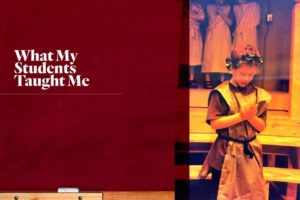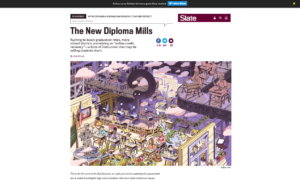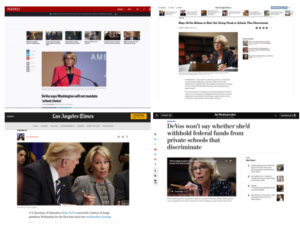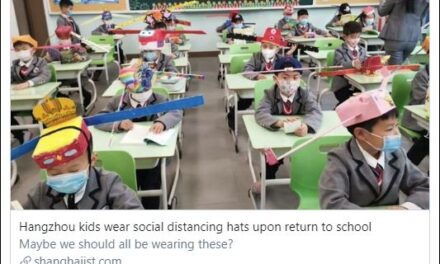
BEST OF THE WEEK

There’s a new podcast series from The Atlantic called “What My Students Taught Me.” Focused on teacher-student pairs, the first episode of the series is about a teacher and the kid he hated.
If the pairs got to speak directly to each other about their experience, it would be a more powerful StoryCorps-type listening experience. But it’s still fascinating to hear the teacher reflect on how he over the years learned better to work with kids like this, and to hear the former student reflect on being so distracted and misunderstood at the time.

Also via The Teacher Project, Slate has launched an eight-part series, called “The Big Shorcut,” about how online credit recovery “is turning more and more U.S. high schools into diploma mills.”
Online credit recovery not a new story at this point, but it’s an important one, and the series addresses policy issues, exceptions, and student perspectives. Plus there is some nice artwork. Start here.
OVERDOING IT ON THE DEVOS/BUDGET COVERAGE?

Why do news outlets spend so much time covering the President’s budget request? Is it the thought that the numbers being proposed are going to have some real-world impact? Is it that the proposed spending levels are symbolic, a statement of values that readers need to know about? Or maybe it’s because everyone else is doing it, and in cases where the proposed spending levels are quite different from previous proposals, outrage equals social media shares and reader engagement?
Whatever the case may be, editors and reporters should give it some thought and provide readers with an explanation. Otherwise it just seems bizarre.
There are some of the same over-coverage/coverage rationale questions about DeVos’s Congressional appearance and her “big” education speech earlier in the week.
About the speech, either reporters were sold a bill of goods by USDE officials, or they oversold editors and readers on the speech’s substance. Either way, it was anticlimactic. See The 74, Chalkbeat, Washington Post, Politico.
About the testimony, The Washington Post set up the Congressional showdown. According to The 74, she fumbled again. According to the LA Times, she still doesn’t have answers. According to the NYT, she was weak on anti-discrimination. According to EdWeek, she was battling against Democrats on multiple fronts.
It just seems pretty mindless and superficial at times, and like a waste of reporters’ (and readers’) time and energies.
Do political news better – Maggie Haberman-style. Explain to readers why a Presidential wish list, a speech, a Congressional appearance matters, a la Vox. Or, find a more obviously meaningful story to tell us about.
HONORABLE MENTIONS
OK, OK. Back to great education journalism:
In Indianapolis, a high-performing charter high school just became part of the school district. Chalkbeat has all the details.
What happens to cops who lose their jobs in Georgia? According to the Atlanta Journal-Constitution, they get hired as school resource officers.
What if anything did the reform victory in LAUSD mean? The LA Times looks at potential implications for UTLA, the teachers union.
Diverse Issues in Higher Education’s Jamaal Abdul-Alim got the scoop on the hacker who tried to use FAFSA to get Trump’s tax returns. Let that sink in a minute.
One of the current Spencer Education Fellows penned a long feature about the Common Core lessons for Brazil, which is attempting to implement national standards.
The Cincinnati Enquirer follows the long trail of a teacher who’s been accused of fraternizing with students since 2003 but remains in a classroom.
Get a fresh take on Detroit’s public schools in this Beth Hawkins feature, which I’m told is very, very good and plan to read over the long weekend.
FROM THE GRADE
In this week’s column, Chicago-based contributor Evan F. Moore – son of educators – took a look at media coverage of education in Chicago, interviewing teachers, students, and WBEZ’s own education reporter Sarah Karp, and found some familiar complaints (not enough success stories) and a few new ones (not enough students quoted).
I first came across Moore’s work a while back, when he covered the tensions with teachers unions at the Black Lives Matter protests.
Also new this week:
There are a ton of education reporters cited for excellence in this year’s Green Eye Shade awards, focused on journalism in 11 Southern states, including Kendi Rainwater, Rowan Moore Gerety, Jeff Solocheck, Adam Walser.
There’s also a gentrification story written by the husband of an Atlanta Public Schools teacher. Do the author and his wife choose the local elementary school, or the high-achieving charter?
It’s like Nikole Hannah-Jones’ New York Times Magazine feature about moving to Fort Greene and picking a school for their daughter, except, well…
Last but not least:
There’s not been enough coverage of the Purdue/Kaplan purchase, warns Media Matters Are you on it? Start with this WSJ opinion piece, perhaps.
Lots of education news organizations get funding from Walton, including NPR, The 74, Chalkbeat, EdWeek, EWA, and the New York Times. Did you know?
PEOPLE, PLACES, & THINGS

What a big week for education journalist Sarah Carr and the other folks who make up The Teacher Project, with big projects out in Slate and The Atlantic (see above). She and they are everywhere — congrats!
In what may well be a first for education journalism, former Slate education columnist Laura Moser is running for Congress.
It’s always good to see an education reporter on TV. Catch NPR’s Anya Kamenetz on PBS NewsHour, talking about Betsy DeVos and school choice.
Journalists continued to get roughed up doing their jobs this week, and the NYT has a roundup of examples.
KICKERS
Uh-oh. A New Orleans principal wore Nazi-associated rings in a video, and appeared on “white genocide” podcast, according to NOLA.com.
Video: A special education teacher surprised her student with his graduation cap and gown. Viewers like me are relieved to find out the teacher isn’t white. Their exchange turns everyone into a puddle of tears.
ABOUT THE AUTHOR

Alexander Russo
Alexander Russo is founder and editor of The Grade, an award-winning effort to help improve media coverage of education issues. He’s also a Spencer Education Journalism Fellowship winner and a book author. You can reach him at @alexanderrusso.
Visit their website at: https://the-grade.org/












